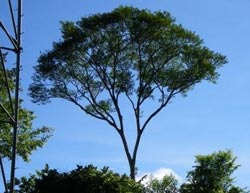Trees grow faster and store more carbon as they age

Tree measurement data from forests around the world shows that many trees do not slow in their growth rate as they get older and larger; instead, their growth keeps accelerating.<br><br>Credit: Photo courtesy of the Smithsonian Tropical Research Institute Archives<br>
The finding that most trees' growth accelerates as they age suggests that large, old trees may play an unexpectedly dynamic role in removing carbon from the atmosphere.
Richard Condit, staff scientist at the Smithsonian Tropical Research Institute, devised the analysis to interpret measurements from more than 600,000 trees belonging to 403 species.
“Rather than slowing down or ceasing growth and carbon uptake, as we previously assumed, most of the oldest trees in forests around the world actually grow faster, taking up more carbon,” Condit said. “A large tree may put on weight equivalent to an entire small tree in a year.”
“If human growth would accelerate at the same rate, we would weigh half a ton by middle age and well over a ton at retirement,” said Nate Stephenson, lead author and forest ecologist with the U.S. Geological Survey.
Whether accelerated growth of individual trees translates into greater carbon storage by aging forests remains to be seen. Programs like the United Nations REDD+ are based on the idea that forest conservation and reforestation mitigate global warming by reducing carbon dioxide in the atmosphere.
In 1980, the first large-scale tree plot was established in Panama in an effort to understand why tropical forests were so diverse. More than 250,000 trees with trunk diameters greater than 1 centimeter were identified and measured within a 50-hectare area.
“ForestGEO is now the foremost forest observatory system in the world with 53 plots in 23 countries and more than 80 partner institutions,” said Stuart Davies, ForestGEO director. “We hope that researchers continue to work with our data and our staff as they ask new questions about how forests respond to global change.”
The Smithsonian Tropical Research Institute, headquartered in Panama City, Panama, is a unit of the Smithsonian Institution. The Institute furthers the understanding of tropical nature and its importance to human welfare, trains students to conduct research in the tropics and promotes conservation by increasing public awareness of the beauty and importance of tropical ecosystems.
Media Contact
All latest news from the category: Agricultural and Forestry Science
Newest articles

Trotting robots reveal emergence of animal gait transitions
A four-legged robot trained with machine learning by EPFL researchers has learned to avoid falls by spontaneously switching between walking, trotting, and pronking – a milestone for roboticists as well…

Innovation promises to prevent power pole-top fires
Engineers in Australia have found a new way to make power-pole insulators resistant to fire and electrical sparking, promising to prevent dangerous pole-top fires and reduce blackouts. Pole-top fires pose…

Possible alternative to antibiotics produced by bacteria
Antibacterial substance from staphylococci discovered with new mechanism of action against natural competitors. Many bacteria produce substances to gain an advantage over competitors in their highly competitive natural environment. Researchers…





















